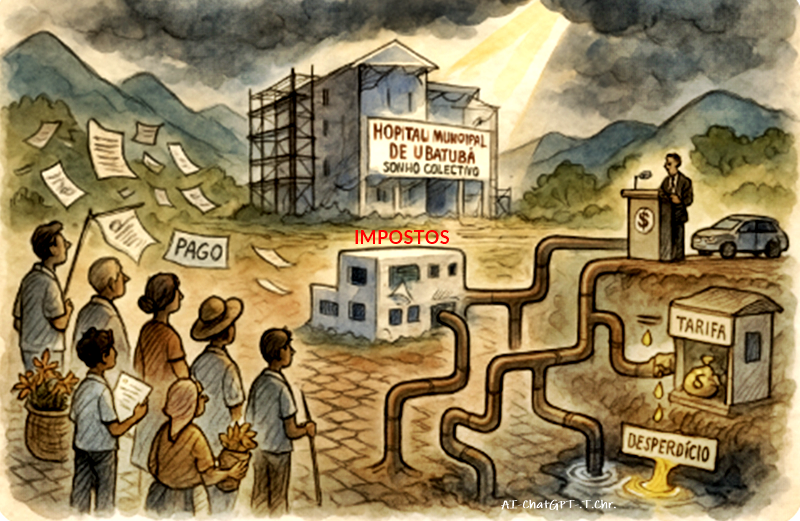Ubatuba Mayor’s Loan Plan and Its Impact

By AI-ChatGPT-T.Chr.-Human Synthesis – 07 August 2025
The Loan. Mayor Flávia Pascoal requested approval from the Ubatuba City Council to contract a loan of R$ 170 million from Caixa Econômica Federal through the federal FINISA program.
- R$ 120 million would be allocated to building a new hospital.
- R$ 50 million would be used for urban infrastructure (paving, drainage, public works).
The loan is not funded by the federal government — it is a debt the municipality will have to pay back with its own resources.
Impact on Residents
The repayment of this debt will come from municipal taxes and fees — which means:
- Possible increases in taxes such as IPTU (Urban Property Tax), ISS (Service Tax), and ITBI (Real Estate Transfer Tax).
- New tariffs for citizens or cuts in public services.
In 2025, the city’s tax revenue grew by 12.8%, indicating that the city hall is already charging residents more:
- IPTU: R$ 70.6 million (+10.3%)
- ISS: R$ 14.9 million (+18.7%)
- ITBI: R$ 9.9 million (+25%)
The city also created the Environmental Preservation Fee (TPA), charged to non-residents arriving in the city by car or bus — a measure that generated controversy. The revenue exceeded R$ 30 million, but with few visible investments in return.
A debt refinancing program (Refis) collected more than R$ 46 million in overdue taxes — showing the city hall’s need for cash, but compromising future revenues.
Legal safeguards
Under Brazil’s Fiscal Responsibility Law (Lei de Responsabilidade Fiscal – Complementary Law 101/2000), a municipality must prove it has the financial capacity to pay before contracting debt. The city council’s approval is a political and legal authorization, not a financial guarantee.
So, in short:
The City Council can authorize the debt but cannot be the collateral. The real collateral is the municipality’s own future revenues or assets, which ultimately means taxpayers’ money is on the hook.
Public Reactions
Residents in forums and on social media express skepticism:
“I wouldn’t mind the loan if the money was actually used for what they say... But this mayor is terrible. It looks more like a re-election campaign fund than a real improvement.”
“Another tax this year... Good to know which cities to avoid. They’ll be crowded and expensive.”
Neighbors Pq Vivamar – 06 August – 8:07 pm
Hello everyone! I just wanted to know why our popular condominium has never been able to convince the city hall to install a pipeline to collect our sewage — at least on Mar Mediterrâneo Street? When I bought my house here 23 years ago, they said the work would be completed in 2 to 3 years. The entire land in the area is floating on sewage containers that are leaking.
Tore Christiansen
https://www.instagram.com/reel/DNBu-BHyffc/?igsh=MTQ5eGxsaHhiOWRvdg==
Neighbors Pq Vivamar – 06 August – 10:06 pm
Hello everyone. Interesting video presented, keeping in mind that years ago Bolsonaro Jr. donated R$ 10 million to Ubatuba for the construction of a new hospital. What happened to that money? I hope the same doesn’t happen again.
I am aware that the construction of drainage pipelines for our runoff is the responsibility of Sabesp, which has now become a private company whose main interest is to increase shareholder value by keeping spending at the legal minimum. The City Hall is retaining only about 2–3% of the shares.
Even so, they have the responsibility to ensure the safety of their residents and the tourists who visit our many beaches, some of which are currently polluted.
Tore Christiansen
Neighbors Pq Vivamar – 06 August – 11:01 pm
Correction... Bolsonaro Jr. recommended a public fund of five million reais, which was increased to ten million reais, to be paid to the Ubatuba City Hall in 2022 by the city of São Paulo.
